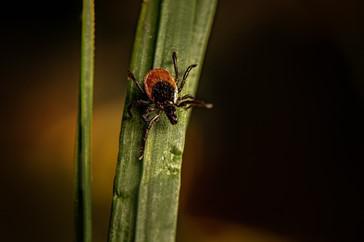Tick-borne diseases are a growing concern in North Carolina
Posted by Mosquito Squad
March 1, 2024
Tick-borne diseases are a growing concern in the Triad area of North Carolina. With the state's diverse landscape and abundant wildlife, ticks have become an all too common nuisance for both us and our pets. These tiny arachnids, found in wooded and grassy areas, can transmit various diseases through their bites. Here are the most prolific ones in North Carolina:
- Lyme disease is perhaps the most well-known tick-borne illness. It is caused by the bacterium Borrelia burgdorferi and can lead to a range of symptoms, including fever, fatigue, headache, muscle and joint aches, and swollen lymph nodes. If left untreated, Lyme disease can cause more severe complications, such as arthritis, neurological problems, and heart disorders.
- Another tick-borne disease found in North Carolina is Rocky Mountain spotted fever (RMSF). This bacterial infection is transmitted by the American dog tick, the lone star tick, and the brown dog tick. RMSF can cause fever, headache, rash, abdominal pain, and muscle aches. If not diagnosed and treated promptly, it can lead to serious complications, including organ damage and even death.
- Ehrlichiosis is yet another tick-borne illness prevalent in North Carolina. It is caused by bacteria of the Ehrlichia genus and is transmitted primarily by the lone star tick. Symptoms include fever, headache, fatigue, muscle aches, and sometimes rash. Severe cases can result in respiratory failure, kidney failure, or neurological problems.
In recent years, there has been an increase in the number of reported cases of tick-borne diseases in our area. This is due to a number of factors, including changes in tick populations, increased outdoor activities, and a lack of awareness from the public about prevention methods.
To protect yourself from tick bites and reduce the risk of tick-borne diseases, it is essential to be proactive in your methods. These include wearing long sleeves and pants when in tick-prone areas, using insect repellents containing DEET or permethrin, checking for ticks after spending time outdoors, and promptly removing any attached ticks.
If you develop symptoms after a tick bite or suspect you may have been exposed to ticks, it is absolutely necessary to seek medical attention. Early diagnosis and treatment can prevent complications and ensure a full recovery.
Tick-borne diseases are a growing concern in North Carolina due to the state's favorable environment to many species. Understanding the symptoms, prevention methods, and seeking timely medical care are essential in combating these illnesses. Take the necessary precaution by calling Mosquito Squad at (336) 347-4462. We can minimize the impact of tick-borne diseases on our health and well-being with an effective treatment plan that lasts the whole summer!
